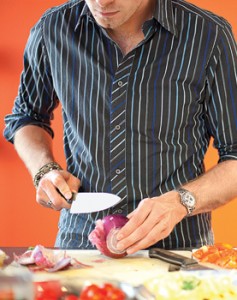 Top tips from Canadian local food movement leaders Sarah Elton, author of Locavore, and Nick Saul, executive director of The Stop, a Toronto-based organization that strives to make healthy food available to everyone through community building, cooking, gardening, and food banks.
Top tips from Canadian local food movement leaders Sarah Elton, author of Locavore, and Nick Saul, executive director of The Stop, a Toronto-based organization that strives to make healthy food available to everyone through community building, cooking, gardening, and food banks.
Get organized: “Students are great at pushing policy forward and getting their administrations to change,” says Elton, food writer and columnist for CBC Radio’s Here and Now in Toronto. She suggests students push to get “the university to have food procurement protocol that guarantees a certain percentage of food comes from local and sustainable farms.” Which is exactly what Local Food Plus, a non-profit organization committed to creating local sustainable food systems, did when they first teamed up with Aramark food services in 2005: a partnership that resulted in 10 per cent of the food served at U of T’s Aramark venues being certified local and sustainable, a figure they hope to increase to 25 per cent this year.
Buy in bulk: “It’s an affordable way of buying local,” says Elton. “Or buy directly from farmers. If a group of people share a purchase, it can ease the financial burden of a one time pay-out.”
Start or join a co-op: That’s what Elton did in university. “Choose one that focuses on buying local and sustainable food. I was able to buy great food at a price I could afford.”
Ask questions: Nick Saul of The Stop says, “Do a bit of a food audit on campus; that could extend to asking, ‘Why do we have these crappy pop machines?’ Or, ‘Why is the cantina serviced by these big bad companies?’ Doing a bit of muckraking in that sector is really important and can make a big change fast.”
Start a cooking collective or garden: “The food movement is pretty robust,” says Saul, “and I can’t imagine it not finding its way onto campuses, whether that’s more individually expressed through a house on campus where everyone is interested in local, organic, sustainable food and they figure out a cooking collective, or they take over a green space and have collective gardens or individual plots—that could easily make a pretty big mark.”